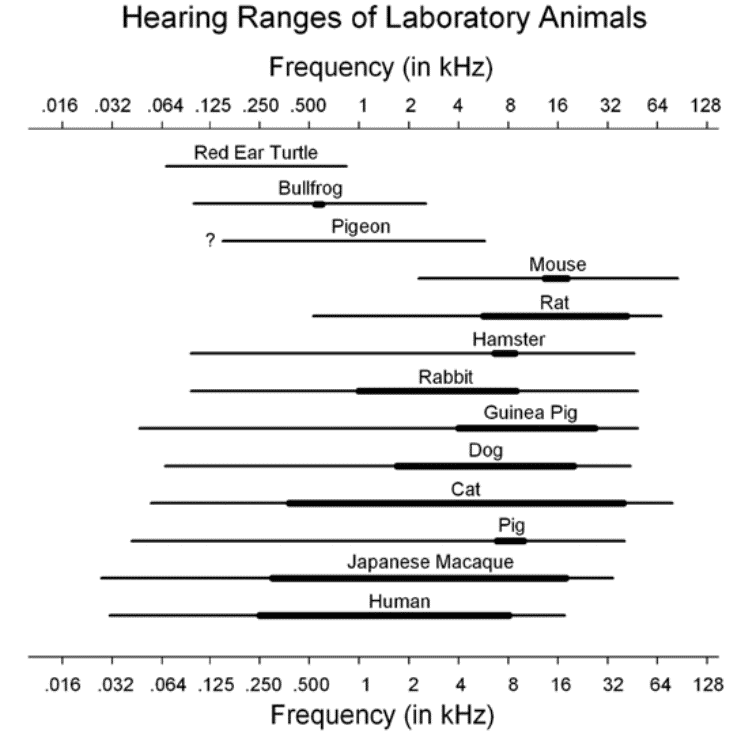As a hamster owner, you might have many questions about how to keep your hamster safe and healthy. You may also have several questions on what to do and what not to do around your hamster. For example, if you love listening to music, you might wonder, “Can I listen to music when my hamster is around? Do hamsters like music?”.
If you have ever had such questions pop up in your mind, you don’t have to worry anymore. You will find answers to all such questions in this blog post.
How well can hamsters hear?
The first thing you should know about hamsters is that they have a very good sense of hearing. They can even hear ultrasonic (>20KHz) sounds, which humans cannot hear. And since hamsters are such small prey creatures, sudden loud noises can terrify and stress them out.
The sounds of some mechanical devices, which humans cannot even hear, will seem loud to hamsters. In a similar sense, the sounds of some musical instruments that sound inspiring to us might sound scary to our hamsters. Also read: Are hamsters sensitive to sound?
So, the real question is – Do hamsters like music, or does music terrify them?
Do hamsters like music?
Many living beings are attracted to music. Chickens lay more eggs if the right kind of music is played. Milk production in cows can be increased by playing calming music. “Easy listening” music makes plants lean toward the speaker, while rock music makes plants lean away from the speaker and stunts their growth (Source: McGill Office for Science and Society).
So, we can say with a certain degree of surety that music can have positive effects on many living beings if the right kind of music is played.
Hamsters aren’t very different, either. According to many hamster owners, hamsters love music.

Positive effects of music
A study that was done in 2018 comparing 42 experimental pieces of research in rodents (rats and mice, not hamsters) found that music can be highly beneficial for health (Source: PubMed). Specifically, the following positive effects were observed:
- Music increased the levels of BDNF in rodents. BDNF stands for Brain Derived Neurotrophic Factor (Source: PubMed). BDNF plays an important role in the growth and survival of neurons and enhances learning and memory. Reduced levels of BDNF are associated with neurodegenerative diseases like Parkinson’s, Alzheimer’s, etc.
- Music might increase the levels of dopamine (the chemical produced in the brain that makes us feel good) in some parts of the brain.
- Music enhanced learning abilities, specifically spatial learning.
- In a majority of the studies, music was found to reduce anxiety-related behavior.
- Music was found to increase the levels of lymphocytes (a type of white blood cells) and other killer cells in the body, which means that music strengthened the immune system of rodents. But this is not universal. For example, loud rock music had the opposite effect – It decreased the levels of leucocytes, a type of cells produced in the bone marrow that are part of the immune system.
- Exposure to music might also reduce the total volume as well as the spread of tumors.
- Exposure to music might also reduce blood pressure levels.
Even though these pieces of research were done only on mice and rats and not on hamsters, remember that hamsters, too, are rodents. So, most of the positive effects of music might apply to hamsters as well.
But even though music might have positive effects on the health of hamsters, not every hamster might experience the same positive effects to the same degree. After all, these positive effects can vary depending on the loudness, frequency, and type of music played.
Don’t forget that each hamster is unique and has his own personality – Some hamsters might be friendly, some might be shy, and some might be scared. Similarly, the music tastes of hamsters can also vary greatly, i.e., the type of music your hamster likes will depend greatly on his personality. So, if you want to find out what type of music your furry friend likes, the best thing to do is to start listening to music when he is awake. But don’t forget that hamsters have a very good sense of hearing. So, don’t play loud music since it can have adverse effects on your hamster’s health.
As you both listen to different kinds of music, observe how he reacts – Does he seem to like the music? Does he show increased activity? Does he fall asleep? Or does he get stressed out? Finding this out and playing the right kind of music can strengthen the bond between you and him. But that being said, there are different types of music. So, where do you start? How do hamsters, in general, react to different music types? What do other hamster owners say? Keep reading to find out.
What music do hamsters like?
Do hamsters like Classical music?
Classical music seems to be the most popular music genre among all animals in general. It is normally quiet and low-pitched, which seems to not disturb animals. It can also be soft and soothing.
Several pieces of research found classical music to reduce anxiety, improve spatial learning and memory, improve the growth and development of nervous tissue, improve dopamine creation, improve immune function, increase pain threshold, and decrease the tumor volume of rodents.
Hamsters are small prey animals that can get scared and stressed due to sudden loud sounds like barking dogs, car horns, thunderstorms, etc. But classical music can help reduce anxiety and help your hamster relax and cope with such external stressors.
Classical music can help your hamster fall asleep. It can also improve his pain threshold. So, classical music is the best music for your hamster.
At high frequencies, classical music was also found to reduce the blood pressure of rats and mice. But it is not surprising since they can hear high frequencies far better than humans (Look at the graph below – The thin lines represent the range of frequencies that an animal can hear only when it is loud enough (>60dB). The thick lines represent the range of frequencies that the same animal can hear, even if it is faint/soft (>10dB)). However, hamsters might enjoy the same positive effects of classical music at comparatively lower frequencies when compared with rats and mice since the hearing ability of hamsters peaks at comparatively lower frequencies.

and laboratory animals (Source: Research Gate)
Do hamsters like Pop music?
Unlike classical music, pop music doesn’t have one universal effect on all hamsters. Some hamsters find it relaxing, some others find it energizing, while others do not notice it at all.
So, when it comes to pop music, the chances that a hamster will like it depends ultimately on the hamster’s personality (Source: Hutch and Cage).
Do hamsters like Upbeat music?
According to research, upbeat music like rock and electronic might reduce blood pressure and reduce anxiety. But rock might also increase immunological response, leading to immune system disorders.
When it comes to hamsters, rock and metal may not necessarily stress them out but only make them more active. It can make them more playful. But if your hamster is already aggressive, it might agitate him and make him want to fight.
If your hamster becomes more playful and if you already have a big hamster cage with enough hamster toys, you have nothing to worry about. However, if your hamster becomes more aggressive, you should turn the music off.
Do hamsters like New-age music?
New age music is a type of music used by people who practice yoga, meditation, and massage as a way of managing stress and creating a peaceful atmosphere (Source: Wikipedia). New-age music has been found to reduce anxiety and improve learning in rodents.
So, it could be beneficial for your hamster too.
Do hamsters like piano music?
Piano music can be soothing. So, it can help reduce your hamster’s anxiety. So, piano music can be a good fit for your hamster.
Type of music based on your goal
Now that we know what each type of music can do let’s look at which type of music would fit your hamster the most.
Best music to help your hamster fall asleep
If there are a lot of external stressors in your house, like vehicle sounds, barking dogs, etc., or if your hamster is generally stressed and restless, it is not easy for your hamster to fall asleep. In this case, you need music that is relaxing and can induce sleep.
The best types of music that match these criteria are classical music, soft jazz, piano music, etc. (Source: Hamster Answers). In general, any instrumental music would do, as long as it doesn’t have a heavy beat and the music isn’t too loud.
But then again, you might want to test a few different songs/music to find the one that your hamster likes.
Best music to calm your hamster down
Hamsters are small prey creatures that face life-death situations almost every day in the wild. Their eyesight may be terrible. But they have sharp senses of hearing and smell and can detect even the slightest movements near them easily. In the wild, these senses help hamsters survive because a predator’s arrival is almost always accompanied by a sudden sound, movement, or smell.
But a pet hamster doesn’t face such life-death scenarios normally. Yet, his senses of hearing, smell, and perception of movement are still sharp. So, sudden sounds and movements can easily scare a hamster and stress him out. As animals of prey, they are also naturally nervous most of the time. But some hamsters are much more nervous than an average hamster.
So, for these hamsters, your need music that is soothing and reduces anxiety. Many genres of music fit these criteria, like classical music and piano music. According to research, Mozart’s music, like K448 and KV361, was found to be very effective in reducing anxiety in rats and mice. But you don’t have to go only for these two songs. You can test several other songs and find the one that your hamster responds to.
Best music to make your hamster happy
Music that is repetitive is thought to keep your hamster happy as well as alert and upbeat. Pop and country music best fit this criterion.
Best music to make your hamster active
Hamsters are tiny animals that can develop diabetes and obesity pretty easily. Even though the risk of a hamster developing diabetes depends mostly on the food he eats, some types of hamsters (Chinese hamsters and Campbell hamsters, to be more precise) are more predisposed to developing diabetes genetically than others. Moreover, some hamsters might be lazy, which can lead up to obesity and diabetes quickly.
For such hamsters, you need music that induces them to play and be active.

This is where rock and metal come in. But if you notice your hamster getting too agitated or too aggressive, then it’s better to stop playing these types of music.
FAQ
How do you know that your hamster likes a type of music?
If your hamster likes a particular type of music or music in general, he will portray one or more of the following positive behaviors:
- Remaining calm
- Paying attention
- Falling asleep
- Becoming playful
- Stopping what he was doing
How do you know that your hamster hates a type of music?
If your hamster dislikes a particular type of music, he will portray one or more of the following negative behaviors:
- Becoming aggressive
- Becoming agitated
- Trying to hide
- Squeaking or making high-pitched sounds
Some hamsters may not be impacted much by music at all. These hamsters may not even notice that music is playing (Source: Pet Educate).
What else should you know about hamsters and music?
- Remember that hamsters are pretty sensitive to sound? So make sure that your music is not too loud that it scares your hamster. Also, make sure that there aren’t any sudden high-pitched sounds in the music you play for your hamster.
- If you want to introduce music into your hamster’s life, you should start early, when he is still young.
- In the beginning, play music only for short amounts of time until your hamster gets used to music. Then, once he gets used to music, you can increase the amount of time you play the music.



